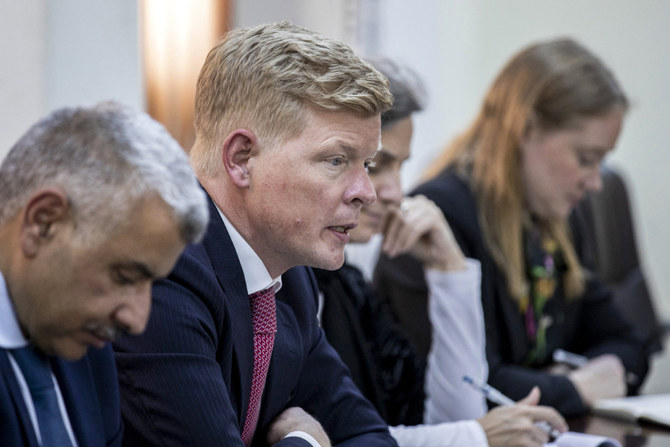NEW YORK CITY: The longer the escalation of Houthi attacks in the Red Sea continues, the more complex the process of mediating a peace process in Yemen will become, the UN warned on Thursday.
Officials expressed concern that the parties involved in the conflict in the country might decide to engage in “risky military adventurism” that would push the country into a new cycle of war.
“Although we have tried to shield the peace process from regional developments since the war in Gaza, the reality is (that) what happens regionally impacts Yemen, and what happens in Yemen can impact the region,” Hans Grundberg, the UN’s special envoy for Yemen said during a meeting of the Security Council to discuss the latest developments in the country and the Red Sea.
“The current trajectory gives cause for serious concern,” he added.
Since November, the Iranian-backed Houthis have been targeting vessels in the Red Sea and the Gulf of Aden, vowing the attacks will continue until Israel ends its war on Gaza. The US and the UK have retaliated by launching military strikes on Houthi-controlled areas.
On March 7, two Filipino nationals and a Vietnamese citizen were killed, and several crew members wounded, when the Houthis attacked a Barbados-flagged merchant carrier in the Gulf of Aden. These were the first deaths caused by the group’s recent attacks on maritime traffic.
Prior to that, the Houthis launched an anti-ballistic missile attack on the Belize-flagged, UK-owned cargo ship Rubymar, causing it to sink early this month. The vessel was carrying 21,000 tonnes of fertilizer, raising environmental concerns that the sinking could cause ecological damage in the Red Sea, including to its coral reefs and marine life.
“With the Red Sea now part of a wider set of concentric circles of escalation,” Grundberg again warned about the risk of further spillovers from the conflict in Gaza. He urged all parties in Yemen to exercise “maximum restraint” and deescalate the conflict in the country, and also reiterated UN calls for an “immediate humanitarian ceasefire in Gaza.”
Within Yemen itself, although hostilities remain at relatively low levels compared with the period prior to the UN-brokered truce in April 2022, Grunderg highlighted recent clashes in Hudaydah, Lahj, Marib, Saadah, Shabwa and Taiz.
“The parties also continue to make public threats to return to war,” he said. “Many Yemenis I have spoken to have expressed their fears of a potential escalation in internal fighting. We must do all we can to prevent this.”
Grundberg added that his focus remains on efforts to reach a ceasefire agreement in Yemen and start a political process for peace.
Edem Wosornu, the director of operations and advocacy at the UN Office for the Coordination of Humanitarian Affairs, warned that the progress made since the 2022 truce was “at risk of unraveling.”
She told council members: “Levels of food insecurity and malnutrition have surged in recent months, posing a real and increasing threat to the lives and well-being of millions of people, particularly women and children.”
Nearly 17.8 million Yemenis need humanitarian assistance to survive, with 5 million children under the age of 5 requiring treatment for acute malnutrition this year. This dire health situation prompted the World Health Organization to warn that the fragile Yemeni health system is overburdened and “edging closer to collapse.”
Wosornu said: “The causes are familiar: conflict, a protracted economic crisis and, increasingly, severe funding shortfalls, which are significantly impacting humanitarian assistance.”
Attacks against vessels in the Red Sea, such as the one on the Rubymar, could have “direct and indirect impacts on the livelihoods of thousands of people in coastal communities that rely on fishing for survival,” she added.
“This incident illustrates the substantial risks posed by growing escalation in and around Yemen.”
Speaking on behalf of the UN’s humanitarian chief, Martin Griffiths, Wosornu reiterated the UN’s call for all parties in Yemen “to comply with international law and refrain from actions that could exacerbate the situation.”
Abdallah Al-Saadi, Yemen’s permanent representative to the UN, said the Houthis “have to stop their military escalation and war against the Yemeni people and their aspirations. They have to bring to an end their threats to regional international peace and security. They have to resort to peace. We have to renew hope for a return to the desire for peace.”
Yamazaki Kazuyuki, Japan’s permanent representative to the UN, strongly condemned the Houthi attacks on maritime traffic, describing them as “outrageous and unjustifiable” actions that are “impeding global commerce and undermining navigational rights and freedoms as well as regional peace and security.”
He added: “The Houthis must stop attacking commercial vessels and immediately release the Japanese-operated (cargo ship) Galaxy Leader and its 25 crew members. The Houthis must also refrain from further threats to maritime security, the environment and the innocent civilians.”
Russia’s deputy permanent representative to the UN, Dmitriy Polyanskiy, called on the international community to persist in its efforts to end Israel’s military operations in the Gaza Strip.
“Resolving that issue will be key to stabilizing the situation, not just in the Red Sea, but in other regions of the Middle East, where Israel's actions are causing righteous anger and outrage,” he told council members.
“The Palestinian question, unresolved for so many years, is also having an impact. Without a just solution to that, based on the agreed international legal parameters, the region will always be a ticking time bomb.
“Burying your head in the sand here is not appropriate and it could destabilize the situation not just at a regional but also a global level. Russia stands ready to do everything necessary to prevent that from happening.






















